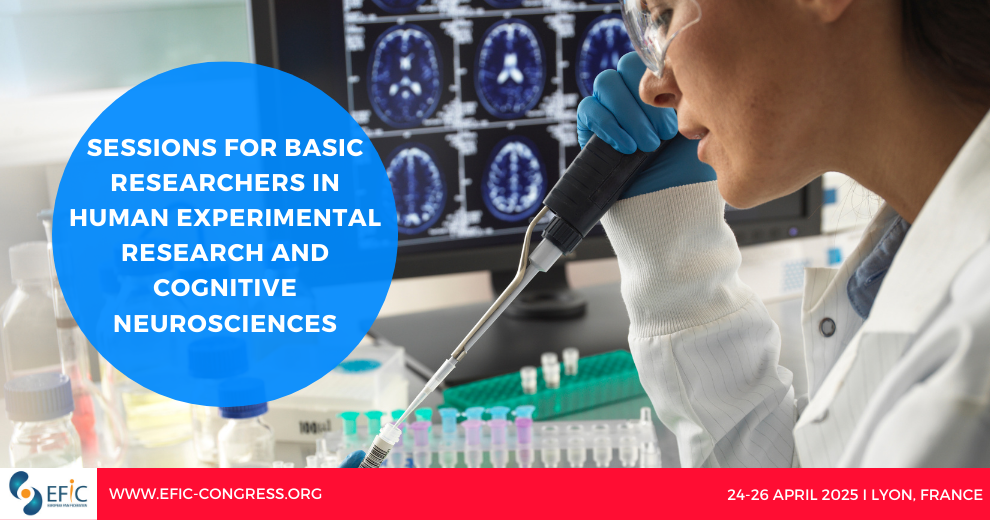The 14th Congress of the European Pain Federation EFIC, taking place in Lyon, France, from 24–26 April 2025, is the leading multidisciplinary meeting for healthcare professionals and researchers dedicated to pain science. At #EFIC2025, experts in human experimental pain research and cognitive neuroscience will explore the latest advancements in neuroimaging, pain perception, and psychological mechanisms of pain. Sessions will cover topics such as early-life pain experiences, neurophysiology-based predictive models, the role of interoception in chronic pain, and the complex interplay between pain, mental health, and cognition. Leading researchers will present innovative approaches to understanding pain mechanisms, from placebo hypoalgesia and effort-based decision-making to the neurobiology of nociplastic pain and pain-depression comorbidities. Join the discussion on cutting-edge scientific discoveries and their translation into clinical practice—register today!
These sessions focus on basic researchers in human experimental research and cognitive neurosciences at #EFIC2025:
| Type | Name | Speaker |
|---|---|---|
| Plenary Sessions | ||
| Early life experiences and chronic pain |
Chair: Nadia Malliou, Belgium Mélanie Noel, Canada |
|
| Neuroimaging Chronic Pain within a Biopsychosocial Framework | Etienne Vachon-Presseau, Canada | |
| How side-effects may improve analgesic treatment efficacy |
Chair: Susanne Becker, Germany Christian Büchel, Germany |
|
| Plenary Debate: Nociplastic Pain |
Chair: Mira Meeus, Belgium Chair: Fernando Cervero, Canada Winfried Häuser, Germany Eva Kosek, Sweden Fusao Kato, Japan |
|
| Topical Workshops | ||
| Revisiting The Reward System In Pain-Depression Comorbidity: The Role Of Perceived Controllability And Uncertainty |
Wiebke Gandhi, United Kingdom Susanne Becker, Germany Ali Khatibi, United Kingdom |
|
| Pain in Human Foetuses and Children: Insights Into How Early Life Pain is Experienced and Assessed |
Chair: Camille Fauchon, France Judith Kappesser, Germany Lisandra Stein Bernardes, Denmark Siloé Corvin, France Christine Chambers, Canada |
|
| Interoception: Bridging Chronic Pain and Mental Health? Exploring New Insights and Intervention Opportunities Throughout the Lifespan |
Lauren Heathcote, United Kingdom Tanja Hechler, Germany Fadel Zeidan, United States |
|
| The Paradox Of Non-Suicidal Self-Injury: Why Do People Cut Themselves – Because Of Or In spite Of Pain? |
Christian Schmahl, Germany Ulf Baumgärtner, Germany Caterina Maria Leone, Italy |
|
| Investigating Brain Networks Relevant to Emotional Pain Processing: Emphasis on Research in Special Pediatric and Adult Populations |
Marina Lopez-Sola, Spain Sarah Nelson, United States Massieh Moayedi, Canada |
|
| French Research Network: Advances in Pain Mechanisms and Therapeutic Approaches | ||
| Cellular and Population-Level Coding of Temperature and Pain in the Rodent and Human Brain |
Alexandra G. Mitchell, Denmark Mikkel Vestergaard, Germany Thomas Nevian, Switzerland |
|
| Motor Behaviour and Pain in Real Life Settings: Current Clinical and Research Advances |
Diego Vitali, United Kingdom Guillaume Christe, Switzerland Mira Meeus, Belgium |
|
| The Interplay Between Pain and Mental Health Disturbances in Autism and Neurodevelopmental Disabilities: From the Lab to the Real World |
Irit Weissman-Fogel, Israel Frank Symons, United States Brian McGuire, Ireland |
|
| Translating Non-invasive Neuromodulation into Clinical Practice in Chronic Pain (and Depression) |
Giulia Liberati, Belgium Thomas Graven-Nielsen, Denmark Markus Ploner, Germany |
|
|
Neuroimaging- And Neurophysiology-Based Predictive Models Of Acute And Chronic Pain
|
Etienne Vachon-Presseau, CanadaLaura Malaguti Modernell, France Florian Chouchou, France Camille Fauchon, France |
|
| Connecting Emotions, Brain, and Body in Complex Regional Pain Syndrome as a Model for Pain Chronification after Trauma |
Heike Rittner, Germany Eija Kalso, Finland Paul Geha, United States |
|
| Sleep and Pain – Clearing the Brain | ||
| Novel Psychological Mechanisms in Chronic Pain: A Focus on Stickiness, Expectation Change, and Effort-Based Decision Making |
Laura Carter, United Kingdom Tobias Kube, Germany Stefaan Van Damme, Belgium |
|
| The Pain Catastrophizing Debate |
Chris Eccleston, United Kingdom Michael Sullivan, Canada Fiona Webster, Canada Geert Crombez, Belgium |
|
| Pain and the Bayesian Brain: Insights from Computational Models of Placebo Hypoalgesia and the Effects of Agency on Pain |
Arthur Courtin, Denmark Christian Büchel, Germany Dounia Mulders, Belgium Andreas Strube, United States |
|
| Habituation and Sensitization to Noxious Stimuli: History, Mechanisms And Clinical Potential |
Maite van der Miesen, Netherlands Rich Harrison, United Kingdom Michèle Hubli, Switzerland |
|
| The Interruptive Function of Pain and its Cognitive Modulation – An Update of Fundamental and Clinical Research |
Katarina Forkmann, Germany Valéry Legrain, Belgium Dimitri Van Ryckeghem, Netherlands |
